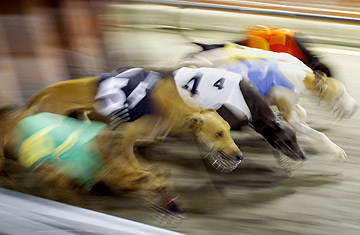
Greyhounds burst out of the starting block during races in Macau.
The face Macau shows to the world today may be its 29 sparkling casinos, but one of the last links with the city's gambling past can still be found two miles away from the main strip, in a plastic reproduction of Rome's Coliseum that stands out amid the dowdy surroundings of its working-class neighborhood. Inside, six sinewy greyhounds stand shivering on an oval race track, waiting for a mud-stained mechanical rabbit to give them something to chase. Even on this Saturday night, most of the red plastic seats at the Yat Yuen Canidrome remain empty. "Before, when I came here, there were so many people you had to stand up to see anything," says Mr. Wong, a Macanese regular at the track who wouldn't give his full name. "There are definitely a lot less people now."
Last year, gambling revenue in Macau jumped 46% to $10.3 billion, putting the Chinese city on track to surpass the entire state of Nevada in gaming income. That income has soared since the city ended a casino monopoly in 2002, but the gambling boom has not exactly reinvigorated interest in dog racing. Last year, the Canidrome earned just $12 million; the Venetian Macau, by comparison, raked in $418 million in its first quarter since opening last August. Unlike the more serious gamblers who hit the city's baccarat tables, the few hundred spectators at the Canidrome on most nights are mostly tourists from mainland China. "We're not that interested in gambling," says Ms. Fang, who came to Macau with a mainland tour group. "We're just here for fun." After betting on two races, Fang had lost nearly $2 and was ready to call it quits.
The track's shrinking revenue is bad news for Macau's greyhound population: Some 300 to 400 of the racing dogs are destroyed each year, a Canidrome official told the South China Morning Post last August. (The Canidrome declined interview requests.) A local law confines greyhound ownership to the Canidrome, making it impossible for anyone else to adopt the dogs. Some are injured or too old to race — greyhounds have a racing life of only two to three years — but others have simply been deemed too expensive for the struggling enterprise to maintain. "They're making a huge mistake," says Cynthia Branigan, founder of Make Peace With Animals, a Pennsylvania-based greyhound adoption organization. "If they want more business, they must promote adoption and prove this is a wholesome activity."
Times weren't always so tough at the track. Crowds packed the Canidrome after it opened in 1931, but races were suspended six years later after Japan invaded China. During its 25-year racing hiatus, the track served as a temporary safe haven for political refugees spilling over the border from the mainland. When it finally reopened in 1963, eager punters formed long lines to get through the doors, while ferries from Hong Kong arrived crammed with dog-racing fanatics.
The decline of dog racing is hardly unique to Macau. Faced with competition from casinos, betting revenue from greyhound racing in the U.S. slumped by 45% during the 1990s, according to the American Gaming Association. "It's a sport that's on the decline," says Branigan. There's competition from casinos and other sports, she says, "but a great deal also has to do with the public's perception: people equate it to dogfighting or cockfighting." Though many U.S. organizations place former race dogs in adoptive homes, Branigan says at least 5,000 are killed every year in the U.S.
Dog-racing devotees like Wong are harder to find these days. All four racing nights a week, the 54-year-old taxi driver parks himself in the back row of the Canidrome with a racing guide and a pack of cigarettes. "Dog racing is my passion," he says. "That's why I still come here." Out on the track, the dogs are chasing the rabbit, into an uncertain future.
